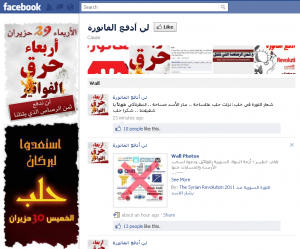Social Media News No. 18

 The opposition conference held in Damascus on June 27 sparked a fierce debate in social networking circles.
The opposition conference held in Damascus on June 27 sparked a fierce debate in social networking circles.
The conference, which supported the peaceful uprising in Syria and demanded freedom and democracy, focused on practical ways to organise different social groups.
According to the organisers, the participants were independent figures and non-partisan opponents who do not represent substitute any one opposition group.
The discussions about the feasibility of this meeting dominated Facebook pages, where some users wrote slogans such as, “No dialogue until Bashar steps down”, or “the street is the first and last decider”.
Other users wrote, “People want to overthrow the Syrian regime, and any lesser compromise is a betrayal of the martyrs’ blood” and “the results of the meeting are known, and do not serve the interests of the demonstrators. The conference will only prolong the life of the Syrian regime, leading to heavy responses by protestors”.
Many opponents of the meeting said that there were two essential conditions to be taken into consideration: the withdrawal of the army from the streets and the release of political prisoners. They also expressed their fear that this meeting would lead to the fragementation of the opposition, which will be for the good of the regime.
Nevertheless, another group of activists on Facebook expressed positive views about the meeting. They wrote, “We should not question the credibility of sides trying hard and in a noble way to help the afflicted Syrian people” and “this is the most important meeting held so far”.
Other users warned against trying to impose one opinion on the anti-regime movement. “Is it really the case that one may not express his opinion if we do not like it?” asked one commenter. “Are we the apex of this country? Do we represent our country as a whole? What about the silent majority?”
The page of this activist can be found on the link: https://www.facebook.com/profile.php?id=100000243671672

Economics and Civil Disobedience
Friday is now a fixed date for demonstration in many Syrian cities and neighbourhoods. There are also women-only and night-time protests, in addition to so called “pilot protests” which are mostly small ones that break up before the arrival of the police, in order to start in another street a little while later.
These political movements, along with the military response from the authorities, are starting to influence the economic situation in the country, including fuel supplies.
Drivers in Hamat highlighted this problem by organising a strike on June 28stressing their need for gasoline.
The importance of economical factors has also been shown on Facebook, where groups are pressuring the authorities by calling for money to be withdrawn from Syrian banks.
Another initiative called Syrians to support the peaceful movement of the revolution by not paying their electricity, water, local and mobile phones bills.
One group called “I will not pay the bill” included more than 2,200 members who said, “We support our currency and we want the Syrian people to keep their funds in the Syrian lire to back the economy of New Syria, not to spend it for the benefit of the regime which is still smuggling money outside the country”.

The video related to the strike can be found on the link: https://www.youtube.com/watch?v=YJEb00pURMY

And the group “I will not pay the bill” can be found on: http://www.facebook.com/StopPayBills?sk=wall
Political Debate Reflected
A new Facebook group “Sun gathering” (تجمّع شمس) describes itself as a meeting point for secular youth in Syria. It posts on its wall ideas about the role of youth in the coming period. The comments of the users in this group are in English and Arabic. The group tries to discuss secularism, a topic that is often misunderstood in the Arab world and taken to mean anti-religion. Other posts on the wall are about the latest political news for all opposition groups, in addition to monitoring the media coverage in television and newspapers.
The link for the group on Facebook:
https://www.facebook.com/pages/تجمع-شمس/225169647501034
Innovation and Revolution
The protestors’ slogans against the regime, the speeches of President Bashar Al-Assad and political terms used by the official media are all sources of inspiration for new cynical slogans or musical and theatrical satire.
For example, a sarcastic chant in a night protest in Hamat included the term “bacteria” which Assad used in his last speech in June.
A young man yells, “The one who’s killing his people is at ease” or “the one who doesn’t want freedom and says we are tucked”, while the crowd repeats loudly, “Bacteria”.
Other young artists composed a rap song entitled “People want”. The lyrics summarise the protestors’ demands and the agression of the security forces against them. Reactions to the song varied among Syrians; some liked it, and others criticised it and said that rap was an “American tradition”.
On the other hand, the internet satire “Just freedom” gained popularity over the internet. Eight episodes were produced and shown in just one month. The creators of “Just Freedom” described it as “a simple series that criticises the tragedy of the Syrian people using comedy”. It features a short dialogue between two young men about the serious issues in Syria. The man tells his friend that Abou Tony Al-Samman was arrested. When his friend asks him the reason, he replies that the guy arrested was a Salafist. He adds that a little girl was also arrested – because she belongs to the Muslim Brotherhood.

The link for the night protest: https://www.youtube.com/watch?v=ZtWMzueKP5w

The link for the series “Just Freedom”: https://www.youtube.com/watch?v=tTA5A5uTG9Q&feature=autoplay&list=ULlZv0T0xgq3M&index=7&playnext=1

The link for the song “People want”:
https://www.youtube.com/watch?v=wiy_2Qt8yB0&feature=related
